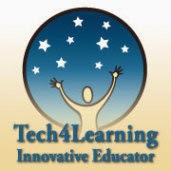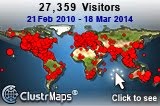 |
So, the one-page target. Last year, we found a rubric called "Evidence of Learning in the 21st Century Classroom" which we used as a starting point. We spent some time re-visioning and re-writing it for our purposes. By "we" I mean two of us, the "21st century learning team." We introduced it to the faculty. We reviewed it as part of our inservice day. After I began reading Unmistakable Impact with #educoach, and became convinced that the target should fit on one page, we shortened it from detailed rubric to just the headings and sub-headings.
When I worked on professional development plans with teachers this year, I connected each plan to one of the domains on the rubric. It was presented to the faculty, not created by the faculty. So we have decided to go back to the drawing board and try to do this the right way, with input from anyone who is interested in adding their ideas.
What we have now has six pages of details in addition to the one page summary. It assumes background knowledge that teachers may or may not have. In lieu of already having the background understanding, we have included references to several other documents.
Here is the one-page summary:
I am hopeful that we are on the right track and that, once we have a group-sourced, one-page target, we will be that much closer to a structure that guides and supports us in the continual effort toward improving teaching and learning.
Bullseye: http://www.flickr.com/photos/2inches/484133264/






3 comments:
Hi Andrea,
Love this, "It was presented to the faculty, not created by the faculty. So we have decided to go back to the drawing board and try to do this the right way, with input from anyone who is interested in adding their ideas." Fabulous insight about creating the vision for 21st century learning collectively.
I look forward to hearing more about this.
Kind regards,
Tracy
Hi Tracy,
Thanks for your thoughts. This post was actually the tangent to the post I had planned to write about creating authentic tasks. I started to back up and think about all the pieces and parts of teaching- there is so much more than just designing tasks. And yet we have talked about how, if the task changes, maybe everything changes.
But then I guess I have to face the facts that what I think is good education is not the same as what others think. Education is such an inexact science and yet it's so important.
At least the time spent talking about it is well-spent, and even if we don't agree, the process of finding common ground will be useful.
Hi Andrea,
My name is Anna Zhuo and I am a student in EDM310 at the University of South Alabama. I enjoyed your post and it makes me re-think about educators. It also makes me think about the changes in education.
I like the idea that this "one-page summary" is presented to the faculty and not created by the faculty. Education has changed/shifted and I think we all need to be 21st century learners and educators, not the 19th. What you are doing is great because you are trying to cope with the change. Not many educators would do that. When there is a change in society, there will be a change in learning and education. When there is a change in education, educators need to re-define their purpose and tasks. The chart you provided is superb.
I do have a question for you as a student who wants to become a future educator.
What advice would you give to a future educator? Or what would you like to impart to us future educators?
I apologize if my understanding of your post/article is not correct! Thank you for your insight!! I enjoyed reading this and your other posts.
Regards,
Anna Zhuo
Post a Comment